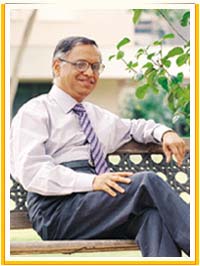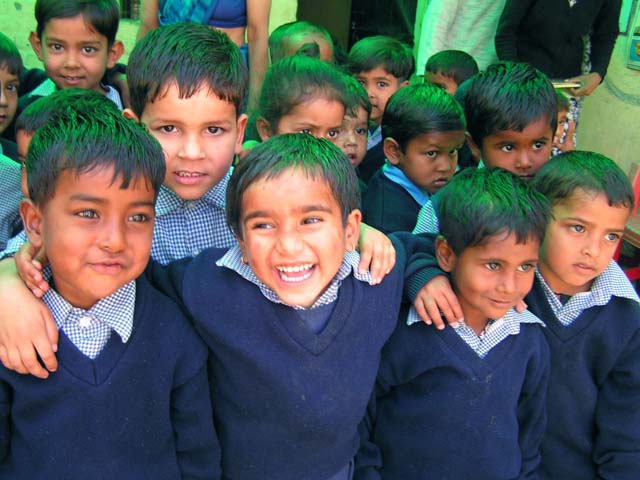
2010.
Stare at the numerical long enough and you get the sense of the start of an almost futuristic, hefty new decade. At such a moment, it’s a good idea to evaluate the past and think about the future by sharing some thoughts from N.R. Narayana Murthy, the founder-chairman of Infosys Technologies Ltd. The company which started with a capital of $250 in 1981, in 2007 exceeded $ 3 billion in global revenue and its market capitalization is around $ 27 billion. Murthy was ranked by The Economist as among the ten most-admired global business leaders in 2005, and has received the Padma Vibhushan by the Government of India.
His ideas could be a road map, a blueprint for a better tomorrow. In just two words, his mantra for a better world – Inclusive Growth.
Murthy spoke at an event organized by America India Foundation (AIF) in New York in September where he was introduced by Victor Menezes, a founder and co-chair of AIF, the former senior vice chairman of Citigroup and a current senior advisor to New Silk Route LLC, a private equity firm in New York. Calling Murthy an icon of Indian business, Menezes said, “Every time I listen to him, I learn something new, something profound.”

Menezes highlighted two quotes by Murthy which I think could be great road signs for anyone looking to have a meaningful and productive year – and decade. As the Chairman of Infosys, which he raised to a world-class global company, he says, “Our assets walk out of the door each evening – and we have to make sure they come back next morning.”
The Infosys emphasis on putting people first is a quality which all of us, no matter in which business or walk of life we are, can try and emulate. While a global company like Infosys thrives on transparency, fairness and people power, Murthy’s commitment to philanthropy adds yet another dimension to a well-lived life, which most of us are trying to achieve.
Says Murthy: “The real power of money is the power to give it away.” An intriguing thought in these days of economic debacles where everyone wants to play the Me First game, and compassion seems to play no part in decisions.
For Murthy, the magic words to a better world are ‘Inclusive growth.’
He says, “A developed society is one where every individual, every citizen has reasonable access to better his or her opportunity through hard work, enterprise and skills. In such a society there is an acceptable level of access to basic education, basic healthcare, basic nutrition and basic shelter.
Many people that I have spoken to in India and elsewhere mistake development with the availability of more and more facilities which bring luxury for the rich and the middle-class. I don’t think that is true development.”
While acknowledging India’s global recognition as an important country with a GDP growth which is one of the fastest in the world, its $300 billion in reserves and its success in everything from industry to software to telecommunications, Murthy emphasizes what still needs to be done.
“Many poor people, many middle – class people have indeed moved to the middle class and upper middle class,” he says. “The quality of life has indeed improved for them. However, this progress has not been shared by every Indian. India has over 350 million people who earn less than a dollar a day. Just 50 rupees – this is barely sufficient to have a lunch, dinner and a breakfast. Forget about savings, forget about education, forget about health care, forget about shelter. This number is more than the population of the entire country in 1947.”
He adds, “Adult literacy rate is around 66 percent, which means we have the largest mass of illiterates in the world. We also have the largest mass of poor people in the world. Over 250 million Indians do not have access to safe drinking water. India has only 1.5 hospital beds per 1000 people, lower than in the average of 3 to 4 per 1000 people in nations like Brazil and China, and way behind developed countries which have 5 to 8 beds per 1000 people.”
He points out that it is an established fact that education helps in the improvement of income levels, thereby reducing poverty and enabling economic growth. Yet the gross enrollment rate for primary and secondary schools in India, according to a UNDP report, is less that 60 percent, and 50 percent of rural schools have only one teacher for two classes.

“In other words, our GDP growth rate, which has been wonderful, has not percolated down to the lower levels. We have not achieved inclusive growth,” says Murthy.
He adds, “Franklin Delano Roosevelt once remarked, ‘The test of our progress is not whether we add more to the abundance of those who have much but whether we provide enough for those who have too little.’ I think in some way he summed up the challenge for India. India cannot indeed become a nation of islands of high growth and vast areas untouched by development. We have to bring the benefits of our economic growth to make life better for all Indians and not just the elite as has happened so far. Inclusive growth is essential for national development.”
He suggests a framework for nation building where ordinary citizens can have control over their material circumstances. He emphasizes core values to be practiced by all citizens – good work ethic, honesty, discipline, secularism, austerity and high aspirations; transformational and value based trustworthy leadership; and liberation of the colonial mindset of the elite and the powerful in a post-colonial society. He says of the elite: “They should not secede from the real India. They should live like the rest, understand the problems and solve them.”
The quality of public government has to be improved and he feels that citizens have to stand up as Indians and demand good government and participate in public governance. He thinks there is even a need for a new party which can become a role model for all other parties. He says: “We have to become decent citizens and follow good values and enhance the critical mass of good people.”
Murthy has some straight talk for non-resident Indians too: “Become good citizens of whatever societies you choose, US, Canada, the U.K, – it doesn’t matter – but it’s important to become good citizens of those societies and enhance the prestige of India. Excel in your profession, pay all your taxes, take part in community activity, live peacefully, identify yourself with the country that you have chosen to live in.”
He mentions the many organizations created by NRIs which have been examples of excellence such as America India Foundation including Clinton Fellowship program and Digital Equalizer program, The Indus Entrepreneurs (TiE), Rajat Gupta’s founding of Indian School of Business, the Deshpande Foundation, Akshaya Patra Foundation, and Vikram Akula’s SKS Microfinance Institute.
He recalls a student of Indian origin at University of Pennsylvania who approached him, asking what he could do to help India. Murthy, who is on the board of Wharton, asked him to collect used text books in basic physics, math and chemistry from students who no longer needed them and ship them to India, and he would personally take on the responsibility of distributing them to colleges. The student delivered by actually collecting 1500 books. Says Murthy: “The point I’m trying to make is that it is possible for every one of us to add value to the country by our own actions.”

No effort is too small, he says, and he encourages those who travel to India to visit schools and colleges and talk about the need to accelerate development and bridge the gap between rich and poor, and discuss how it’s been done in other countries. These he feels are exciting stories for the children and will help them to be more optimistic. He’s even thinking of a talent exchange where overseas visitors can connect with institutions.
“I have never ever come across one NRI – a single NRI – who has not been positive about India, who is not willing to add value to India,” he says. “The need of the day is to raise the confidence and optimism of the younger people in the country. This is the time for India to consolidate and capitalize on her economic progress – work harder and smarter and bring about an inclusive growth. Once we all put our shoulders together to make this happen I have no doubt that all the problems will disappear like dew on a sunny morning.”
After the debacles of the past year when we saw where greed, unaccountability and selfishness can take us, Murthy’s exhortation for inclusive growth seems the way to go, to create a civil society.
Be it in India or the US or elsewhere in the world, his words seem very practical – yet seductive – as a new year dawns. “I believe we have all at some time eaten the fruit from trees that we did not plant,” he writes in ‘A Better India, A Better World’ (Penguin India) “In the fullness of time, when it is our turn to give, we must in turn plant gardens that we may never eat the fruit of, which will benefit the generations to come.”
As one sets goals for the New Year, there’s nothing nicer than finding that what you want to do jells with what you should do.
In the book, Murthy recalls a Bill Moyers television interview with Joseph Campbell which had a great impact on him: “Deep into a profound discussion about life, Bill Moyers leaned over and asked Joseph Campbell, ‘Joe, I am sure you have thought about this question. Why are we here on the earth? What is the path for one to follow?’ Joseph Campbell smiled and said, ‘Yes, I have thought about it and the only answer I have found is this: Follow your bliss. All else will follow.’”
To which Narayana Murthy adds, to all those who will listen, “I urge you to do the same: Choose a worthy dream for yourself. Go after it confidently. Create a life that you will be proud of in the years to come. But always, without fail, ensure that you follow your bliss.”

1 Comment
Pingback: Tweets that mention Lassi With Lavina » The Buzz » Narayana Murthy’s Roadmap for 2010 -- Topsy.com